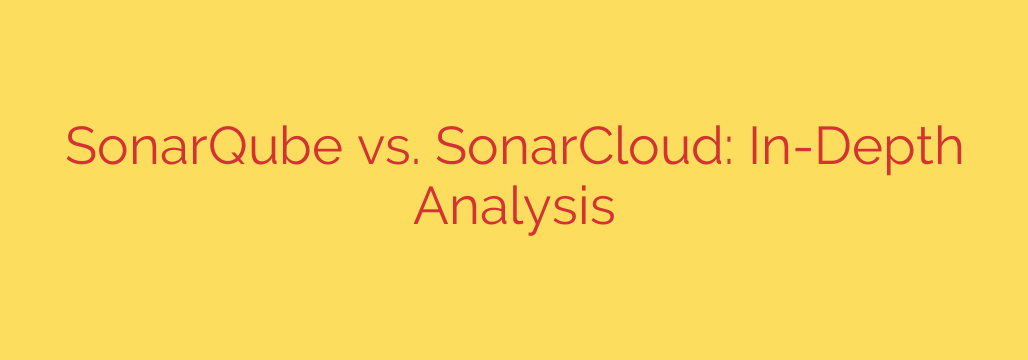
SonarQube vs. SonarCloud: Which Code Quality Tool is Right for You?
In modern software development, maintaining high code quality and security isn’t just a best practice—it’s a necessity. Static code analysis tools are crucial for identifying bugs, vulnerabilities, and code smells early in the development lifecycle. Among the leaders in this space are SonarQube and SonarCloud, both powerful offerings from Sonar.
While they share the same powerful analysis engine, they are designed for very different use cases. Choosing the right one depends entirely on your team’s infrastructure, compliance requirements, and operational preferences. This guide breaks down the key differences to help you make an informed decision.
At the Core: Deployment and Hosting
The most fundamental difference between SonarQube and SonarCloud lies in their deployment models.
SonarQube is a self-hosted, on-premise solution. This means you are responsible for installing, configuring, and maintaining the SonarQube server on your own infrastructure. You have complete control over the environment, data storage, and security configurations. This is ideal for organizations with strict data privacy policies or those that need to operate in an air-gapped environment.
SonarCloud is a cloud-based SaaS (Software as a Service) offering. Sonar manages the entire infrastructure for you. There’s no server to set up or database to maintain. You simply sign up, connect it to your cloud-based repository (like GitHub, GitLab, Bitbucket Cloud, or Azure DevOps), and start analyzing. This model prioritizes convenience and ease of use.
Setup, Maintenance, and Scalability
Your choice of deployment directly impacts the effort required for setup and ongoing maintenance.
With SonarQube, your team is responsible for:
- Initial server setup and configuration.
- Database provisioning and management.
- Performing version upgrades and applying patches.
- Managing server resources and scaling the infrastructure as your codebase grows.
This provides maximum flexibility but requires dedicated administrative resources and expertise.
With SonarCloud, the experience is virtually maintenance-free. Sonar handles all backend operations, including updates, backups, and scaling. This allows your team to focus exclusively on analyzing code and improving quality, making it an excellent choice for teams that want to get started quickly without administrative overhead.
Key Features and Integrations
While both platforms use the same static analysis rules and engine, their integration capabilities are tailored to their respective environments.
SonarQube offers extensive customization and a wider range of integrations, especially for bespoke or legacy systems. It can be integrated with virtually any CI/CD tool, including on-premise solutions like Jenkins. It also supports a broader array of authentication methods, such as LDAP and SAML.
SonarCloud is optimized for a seamless cloud-native workflow. It integrates tightly with popular cloud VCS platforms like GitHub, Bitbucket Cloud, and Azure DevOps. Analysis is often triggered automatically on pull requests, providing immediate feedback directly within the developer’s workflow. This tight integration is a major advantage for teams already heavily invested in these cloud ecosystems.
Security, Compliance, and Data Control
For many organizations, data security and regulatory compliance are non-negotiable.
SonarQube provides the ultimate level of control over your data. Since the entire instance and all source code analysis reports are stored on your private infrastructure, you can enforce your own security protocols. This is often a mandatory requirement for industries like finance, healthcare, and government, which handle sensitive information.
SonarCloud operates on a shared, multi-tenant cloud infrastructure. While Sonar employs robust security measures to protect customer data, your code and analysis results reside on their servers. Teams must be comfortable with this model and ensure it aligns with their organization’s data governance policies.
Pricing and Cost Structure
The pricing models for SonarQube and SonarCloud reflect their different delivery methods.
SonarQube offers a free, open-source Community Edition with basic code analysis features. For more advanced capabilities, such as security vulnerability detection and support for more languages, you must purchase a commercial license for the Developer, Enterprise, or Data Center Editions. The cost is based on the number of lines of code you need to analyze.
SonarCloud also offers a free plan for public, open-source projects, making it a fantastic tool for the community. For private projects, it operates on a subscription model, typically priced based on the number of lines of code. This predictable, pay-as-you-go model eliminates the need for large upfront infrastructure investments.
Making the Right Choice: A Quick Guide
Choose SonarQube if:
- You have strict data privacy or regulatory requirements that mandate self-hosting.
- Your infrastructure is primarily on-premise, including your CI/CD servers.
- You require deep customization or integrations with legacy systems.
- You have the in-house technical resources to manage and maintain the server.
Choose SonarCloud if:
- Your team values convenience and minimal administrative overhead.
- Your codebase and CI/CD pipelines are hosted on cloud platforms like GitHub, GitLab Cloud, or Azure DevOps.
- You prefer a predictable, subscription-based pricing model.
- You want to get started with code analysis as quickly as possible.
Actionable Security Tip: Integrate Early and Automate
Regardless of which tool you choose, the key to success is integration. Incorporate static analysis directly into your CI/CD pipeline to scan every pull request or merge request automatically. Use the “Quality Gate” feature in both SonarQube and SonarCloud to fail the build if the code doesn’t meet predefined quality and security standards. This “shift-left” approach ensures that issues are caught and fixed early, long before they reach production.
By understanding these core differences, you can confidently select the Sonar solution that best aligns with your team’s technical landscape, security posture, and operational goals.
Source: https://centlinux.com/sonarqube-vs-sonarcloud/








